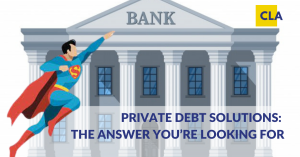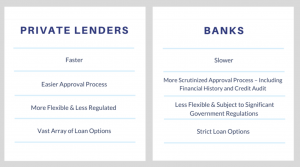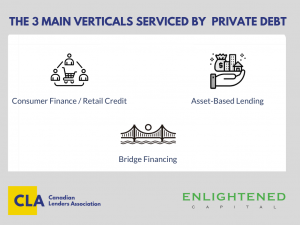
For far too long, a handful of banks have dominated the private debt market in Canada. Current supply-chain bottlenecks and inflation have led to growing retrenchment from banks, causing them to lend more conservatively. On top of this, commercial lending is extremely slow: it can take up to a year to secure a loan due to the complicated and multi-layered decisioning of banks. “This is an issue for the Canadian economy. Capital formation is a challenge for all SME businesses in Canada,” says Jeffrey Deacon, Founder of Private Debt Partners. “The big banks have rigid lending criteria, which through 2008 was viewed as a good thing. But now, it’s become a major problem for SMEs.”
Many businesses who borrowed during the pandemic will have to contend with the aftermath of their debt burdens. In March 2020, businesses added a staggering $52.1 billion in credit debt to their balance sheets, a number that has only grown since. Additionally, household debt swelled to about $2.5 trillion one year into the pandemic, approximately two-thirds of which was mortgage debt.
Clearly, there is a need for private debt solutions that are fast, secure, and flexible.
In 2020, private debt managers raised $3.52 billion, with this figure growing on a year-to-year basis. In an article for AIMA Journal, Belle Kaura of Third Eye Capital writes that “private debt is growing at almost double the rate of private equity. It is a maturing asset class.” Now is the perfect time to capitalize on the intersecting trends of gargantuan debt and low interest rates. “This is what our economy needs,” adds Jeffrey Deacon.
The Differences Between Private Debt Managers and Incumbent Banks:

Since interest rates are currently low, it makes sense for private debt lenders to diversify and/or venture into niche segments to capture higher yields. As the Canadian market continues to emerge from the pandemic, it is likely that this flow of acute debt will continue for some time, creating an opportunity for lenders that are up to the task. According to a Private Credit Fund Intelligence report, 57% of intermediaries plan to increase their private debt allocation in the second half of 2021, indicating that lenders are following these trends closely.
The Main Verticals Serviced by Private Debt Managers:

Source: Enlightened Capital
Consumer Finance/Retail Credit, which covers all point of sale finance, including credit cards and installment loans, is a key vertical serviced by private debt lenders; it allows for lenders to improve the end-to-end customer experience through digital strategies, channels and technologies. Bridge Financing is short-term financing typically raised within 6-18 months of an anticipated public offering. It is intended as temporary financing to cover company costs until longer-term financing is secured. Finally, asset-based lending is secured by inventory, accounts receivable, equipment, or other property owned by the borrower. Asset-based lending is highly favored by successful fund managers, with 69% of survey respondents indicating they would commit more funds to asset-backed lending in upcoming years.
Private lenders across these three verticals can leverage sophisticated technology solutions that can help analyse user data and make better loan-related decisions. In doing so, they will be better able to retain a competitive advantage as more players recognize the untapped market potential of private debt.
One niche form of private lending is venture debt, which can extend capital to technology companies and other startups. It has grown in popularity over the course of the pandemic, helping expand the suite of innovative companies able to service loans and take market share away from big banks. These tech companies opt for venture debt for several reasons including: to reduce the overall cost of capital, to defer equity financing, and to retain majority control of their business longer than they would using equity alone. Some venture capital firms provide bridge financing, in exchange for a percentage of the company. For example, a company might offer a 15% stake in exchange for six months of financing.
One of the leaders in the private debt sector is Enlightened Capital: a senior credit facility for alternative financing solutions, providing expert services to small-mid market companies overlooked by the traditional Schedule A banks. Enlightened Capital is a sector-agnostic, well capitalized private debt fund, managed by a team that has secured over $3.5 billion in deals.
Another leader in the small-mid-market lending ecosystem is SLC Management. The firm offers a range of institutional alternative asset class funds and liability-driven investing strategies to its investors in Canada; as of June 2021, the company had $324B assets under management.
Accord Financial is another player that offers lender financing as part of its solution offerings to help lenders grow their portfolios and offer more loans to customers. The company also offers accounts receivable financing through asset-based lending, for companies looking for flexibility and alternative options to traditional bank financing.
Private debt managers like Enlightened Capital, Accord Financial, and SLC Management provide creative solutions to mid-market Canadian companies, which typically have the least access to capital from traditional sources. In today’s environment, consumers expect real-time decisioning, and alternative lenders generally provide faster turnaround times and are more responsive to clients’ needs.
As we continue to see banks tightening their belts and closing their wallets, alternative lenders will be increasingly recognized for what they are: a superior option.

